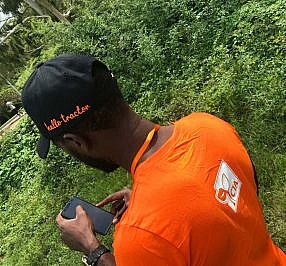As the world’s population continues to increase, it is projected that crop yields will need to double to achieve food security. Sub-Saharan Africa alone holds 60% of the global inventory of uncultivated farmland; yet average crop yields continue to fall well below global averages. In addition to food security, increased agricultural productivity remains critical to alleviating entrenched poverty and improving livelihoods for the millions of farmers that survive on less than US$2/day.
Tractor owners lack the data, knowledge and experience to efficiently deploy tractors in a systematic way. Historically, low levels of mechanisation have been cited as the primary reason for stagnant agricultural productivity in sub-Saharan Africa since the 1960s. In fact, many experts put a lack of mechanisation access as responsible for 50% of Africa’s yield gap.
Hello Tractor
To confront these challenges, Hello Tractor has developed technology to increase and optimise tractor activity across developing markets around the world. This technology uses an ‘Internet-of-Things’ (IoT) digital solution to connect tractor owners to farmers, bridging the gap between traditional farming and more technologically advanced approaches. By running a shared economy model, Hello Tractor’s technology allows smallholder farmers to access tractors on demand, enabling them to plant 40 times faster and at a third of the cost.
Hello Tractor aims to radically transform how the smallholder agricultural ecosystem interacts with and derives value from technology, and as such, much effort has been put into creating a synergy amongst its stakeholders. To ensure that tractor owners are running a profitable business, Hello Tractor’s solution provides a fleet management app that lets them engage with smallholder farming demand through booking agents they engage through the app. These agents, primarily young people from rural farming communities, perform critical market aggregation and ensure idle tractors are connected to farmers, whilst earning a sustainable livelihood. When a Hello Tractor booking agent submits a request, it is routed to tractor owners on the platform based on proximity and tractor availability. This ensures that farmers, who are the end customers, are now able to receive tractor services on a timelier basis that allows them to plant punctually and reap bigger harvests.
Today, Hello Tractor has emerged as the leading provider of technology solutions designed for the tractor services market, capturing 75% of private commercial tractor inflows to Nigeria, touching the lives of 250,000 farmers and, through strategic partnerships, expanded to a total of seven markets across Africa and Asia. Hello Tractor has recorded this kind of success only because, like any good organisation, learning has been at the business’ core. The company’s model of operation was pivoted into one more sustainable and scalable, based off numerous experiences across its markets (Kenya, Nigeria, Senegal, but also other countries in Southern Africa).
Partnership with CTA
In 2019, Hello Tractor and CTA signed a contract to collaborate and facilitate access to digitally-enabled tractors. This contract was signed following a call for proposals launched by CTA and won by Hello Tractor with its project, “Connecting Smallholder Farmers to Tractors Powered by Hello Tractor”.
As part of the project, product demonstrations will be held for demand aggregation; a key objective of these activities will be to raise awareness among farmers and farmer organisations in target areas. Four tractor demonstration days have already been held in Nigeria in April and May 2019: in Yola (Yolde Pate, Fufore communities); Illora community of Oyo State; Ijebu Ode community of Ogun State; and, Tsaragi Edu community of Kwara State. Three further days are planned for Kenya, in Eldoret, Meru, and Nakuru. These activities are being implemented in cooperation with tractor owners, and through these events, farmers are educated on the benefits of mechanisation, particularly using Hello Tractor services.
Another activity of the project has been the selection and training of booking agents. The booking agents’ role is to aggregate tractor demand and manage the hiring of tractors by farmers. These consumer-facing collaborators have been equipped with relevant tractor technology management and customer management skills. A variety of digital materials – including videos, website and app content – are used for the capacity-building sessions. So far, 100 agents and tractor operators have been trained across Nigeria and Kenya, included via virtual training activities.
The booking agents have been selected by responding to requests for expression of interest via social media, but young farmers are also informed about its opportunities through the tractor demonstration days. A closed Facebook community for booking agents has been created; furthermore, an SMS gateway has been developed to support Hello Tractor in disseminating information to booking agents, which is currently being tested. As a result, agents are already facilitating the deployment of tractors to meet farmer demand.
In total, at least 5,500 farmers are expected to benefit from tractor services in the 1-year project timeframe, and 50 booking agents will eventually be involved. Some project activities, such as facilitation of networking with farmers, are implemented in partnership with the Agricultural Technology Foundation. Hello Tractor and CTA will both monitor and evaluate the impacts for farmers, booking agents, operators and service providers.
The project will help Hello Tractor improve its technology and business model, and knowledge generated from the project’s implementation will be captured, including on business modelling in digital entrepreneurship. Two knowledge-sharing workshops will be organised in the timeframe of the project to communicate about the project’s results and learning.
Auteurs : Ken Lohento and Jehiel Oliver – Source: ICT Update of CTA
Date de publication : décembre 2019









